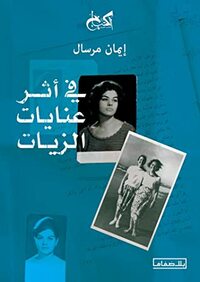Take a photo of a barcode or cover
emotional
informative
reflective
sad
medium-paced
"كل من الحلوات اللواتي لم أتخيل متى وكيف جززن شعرهن أمام المرآة، يعرفن هذه اللحظة حتى لو لم يخبُرنها بأنفسهن. لحظة مواجهة المرآة وتجسد الخواء، لحظة الرغبة في تغيير الذات بعقابها وتشويهها والتخفف من أحد ملامحها. تمر اللحظة، تشعر المرأة بعبث ما فعلته، يزداد غضبها، تهدأ، تدخل في مرحلة من اليأس المستتب، وتكون هي نفس المرحلة التي يحتاجها الشعر لينمو. هذا لم يحدث مع عنايات، دعونا نحتفل بذكراها الليلة. "
emotional
inspiring
reflective
sad
medium-paced
This book is - what I have come to think of as - a speculative biography: It does not aim to bring Enayat to life for the reader, which would be an impossible and problematic task, but invites us to wonder about how Enayat - living, dead; both remembered and forgotten - can teach us about ourselves; our own depression, relationships, creativity, politics, and legacies. There is an intimacy in this book - I felt less that I was reading than listening to Iman Mersal confess around a kitchen table, with the dueling smells of Labne and coffee; at times I could sense tears smearing words - spaces where she had to stop writing only to return years later.
Traces is such an incredible word - probably as important as Enayat - to title the book, which is very much not a trail, not a tangible or linear tale - it is a collection of essays that transport us into the histories of institutions and persons far beyond, but deeply connected to, Enayat, if not for the person that was, then at least for who she became within Mersal. They are traces. Deeply intertwined within these traces are themes and morals, some of which I have attempted to capture in my favorite excerpts below, about the ethics of biographies, the power of the State and the family, the loneliness and isolation of the human experience - particularly that shaded by depression, and the shared humanity across time and space between people - that, as Mersal claims, take two people across the world, no matter how far in space or time, and they both know a third person (like the woodworker who made the bookshelves for the German Institute and Mersal's own house).
I will think about this book for a long time and return to it time and again. It is a masterpiece.
"The journey must begin from the tombs" (266) and so it does as Iman Mersal attempts to, at first, unravel the mysteries that led Enayat to commit suicide. From searching for Ennayat's grave - which she ultimately finds by recruiting experts; to interviewing old family, friends, and neighbors; to walking through the geographies of Ennayat's daily life; to exploring the sociopolitical-personal dynamics in family, marriage, divorce, motherhood and lost love; to searching State and personal archives, where they are available; tracking the history of Ennayat's workplace; to reading Ennayat's unpublished writings and writings about Ennayat; and, finally, to writing Ennayat's interests - including a particularly long passage about the subject of Enayat's own biography into Keimer - we are led on a journey of tracing threads on a tapestry frayed by time and exile.
Favorite Excerpts from Love and Silence: "I am in exile from myself. Who can issue a pardon for my soul, so that it might return, might know the body as its own small true homeland? [...] If I were able, I would erase myself and be reborn, somewhere else, some other time. Another time. Another time... Was I born at the wrong time, maybe?"
Quotation from Young-Bruehl: "Empathizing involves, rather, putting another in yourself, becoming another person's habitat, as it were, but without dissolving the person, without digesting the person. you are mentally pregnant, not with a potential life but with a person; indeed, with a whole life - a person with her history. So the subject lives on in you, and you can, as it were, hear her in this intimacy. But this, as I said, depends on your ability tot ell the difference between the subject and yourself, which means to appreciate the role that she plays in your psychic life. Such insight is the ground onw hich you can distinguish between what you want for yourself, which you may be seeking partly from her, and waht she wanted for herself, which she obviously did not seek fro you (although you may supply part of what she wanted in the biography)." (239)
Bits of wisdom from Mersal:
"...they'd swap memories about events we had only read about." (72)
"I'd read somewhere that every suicide leaves a minimum of six people to deal with the trauma of accepting and understanding what has happened..." (76)
"The doormen are guardians of entire geographies. Incomers from tiny villages, they not only watch over their assigned building, cleaning its stairs and running errands for its residents, they also catalog every detail of the built environment through which they move. As thought he cramped rooms they inhabit... are closed-circuit cameras recording everything that passes their lenses." (96)
"A writer cut off from their peers is transformed into a tragic figure, their delusions (of persecution, of grandeur, of nihilistic despair) ballooning in this isolation until they finally come to what awaits them: to an appointment in some moribund cultural institution, to mysticism or bitter resentment, to the self-obsession and puritanical righteousness of the self-made or to open support for a murderous regime." (220)
"The archive is a manifestation of civilization: an embodied desire to preserve the contiguity, plurality, and contradictions that together make up a collective memory. At the same time, it is ienvitaby a reflection of culture's awareness of its own memory."
Basket Books
Traces is such an incredible word - probably as important as Enayat - to title the book, which is very much not a trail, not a tangible or linear tale - it is a collection of essays that transport us into the histories of institutions and persons far beyond, but deeply connected to, Enayat, if not for the person that was, then at least for who she became within Mersal. They are traces. Deeply intertwined within these traces are themes and morals, some of which I have attempted to capture in my favorite excerpts below, about the ethics of biographies, the power of the State and the family, the loneliness and isolation of the human experience - particularly that shaded by depression, and the shared humanity across time and space between people - that, as Mersal claims, take two people across the world, no matter how far in space or time, and they both know a third person (like the woodworker who made the bookshelves for the German Institute and Mersal's own house).
I will think about this book for a long time and return to it time and again. It is a masterpiece.
"The journey must begin from the tombs" (266) and so it does as Iman Mersal attempts to, at first, unravel the mysteries that led Enayat to commit suicide. From searching for Ennayat's grave - which she ultimately finds by recruiting experts; to interviewing old family, friends, and neighbors; to walking through the geographies of Ennayat's daily life; to exploring the sociopolitical-personal dynamics in family, marriage, divorce, motherhood and lost love; to searching State and personal archives, where they are available; tracking the history of Ennayat's workplace; to reading Ennayat's unpublished writings and writings about Ennayat; and, finally, to writing Ennayat's interests - including a particularly long passage about the subject of Enayat's own biography into Keimer - we are led on a journey of tracing threads on a tapestry frayed by time and exile.
Favorite Excerpts from Love and Silence: "I am in exile from myself. Who can issue a pardon for my soul, so that it might return, might know the body as its own small true homeland? [...] If I were able, I would erase myself and be reborn, somewhere else, some other time. Another time. Another time... Was I born at the wrong time, maybe?"
Quotation from Young-Bruehl: "Empathizing involves, rather, putting another in yourself, becoming another person's habitat, as it were, but without dissolving the person, without digesting the person. you are mentally pregnant, not with a potential life but with a person; indeed, with a whole life - a person with her history. So the subject lives on in you, and you can, as it were, hear her in this intimacy. But this, as I said, depends on your ability tot ell the difference between the subject and yourself, which means to appreciate the role that she plays in your psychic life. Such insight is the ground onw hich you can distinguish between what you want for yourself, which you may be seeking partly from her, and waht she wanted for herself, which she obviously did not seek fro you (although you may supply part of what she wanted in the biography)." (239)
Bits of wisdom from Mersal:
"...they'd swap memories about events we had only read about." (72)
"I'd read somewhere that every suicide leaves a minimum of six people to deal with the trauma of accepting and understanding what has happened..." (76)
"The doormen are guardians of entire geographies. Incomers from tiny villages, they not only watch over their assigned building, cleaning its stairs and running errands for its residents, they also catalog every detail of the built environment through which they move. As thought he cramped rooms they inhabit... are closed-circuit cameras recording everything that passes their lenses." (96)
"A writer cut off from their peers is transformed into a tragic figure, their delusions (of persecution, of grandeur, of nihilistic despair) ballooning in this isolation until they finally come to what awaits them: to an appointment in some moribund cultural institution, to mysticism or bitter resentment, to the self-obsession and puritanical righteousness of the self-made or to open support for a murderous regime." (220)
"The archive is a manifestation of civilization: an embodied desire to preserve the contiguity, plurality, and contradictions that together make up a collective memory. At the same time, it is ienvitaby a reflection of culture's awareness of its own memory."
Basket Books
هذا الكتاب يعنيني، إيمان مرسال تعنيني جدََا، أثر عنايات الذي نقتفيه يعنيني جدََا وجدََا. الكتّاب يملكون هذه القدرة على الاحتفاء بما يعنيهم وأنا أكثر فعل أحبّه في الحياة؛ مشاهدة محب يتحدث عمّا يحب. الشخصيات الخلفية الذين هم في هامش العالم ولكنهم حقيقيون جدََا. من الآن أستعد لإعادة قراءتها
challenging
reflective
slow-paced
adventurous
dark
emotional
informative
inspiring
mysterious
reflective
sad
tense
medium-paced
emotional
informative
reflective
sad
slow-paced
واحد من أجمل الكتب التي قرأتها هذا العام. إن لم يكن أجملهم على الإطلاق. لغة بديعة وسرد شديد الذكاء. وعلى حسب علمي هي تجربة نادرة في اللغة العربية. مش عارف أوصف بالضبط نقطة ثقله الأساسية. لكن الواحد يقدر يقول إنه كتاب غني. غني بالتفاصيل والشخصيات والحكايات، والنقلات والمشاعر. تعبير غني تعبير مبهم يمكن. لكنه الأقرب لما فكرت فيه طيلة الكتاب. والحقيقة كتابة إيمان مرسال فعلًا واحدة من أكثر الكتابات المؤثرة بالنسبة لي. سواء في الشعر أو النثر، وعندها يختلط الاثنان طول الوقت. الكتاب تتبع لسيرة عنايات الزيّات وروايتها الوحيدة، وطول الوقت يشعر الواحد إن كتاب إيمان مرسال مزيج من الملاحظات الشخصية والنقد الأدبي والتدوين والقصة. مزيج جميل صنع كتاب مختلف ورائق فعلًا.



